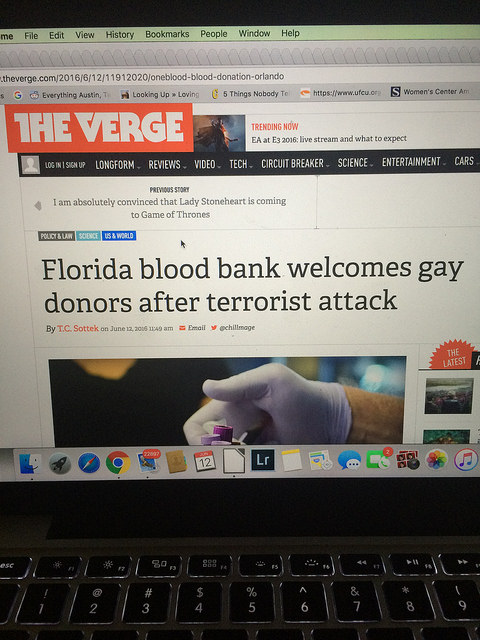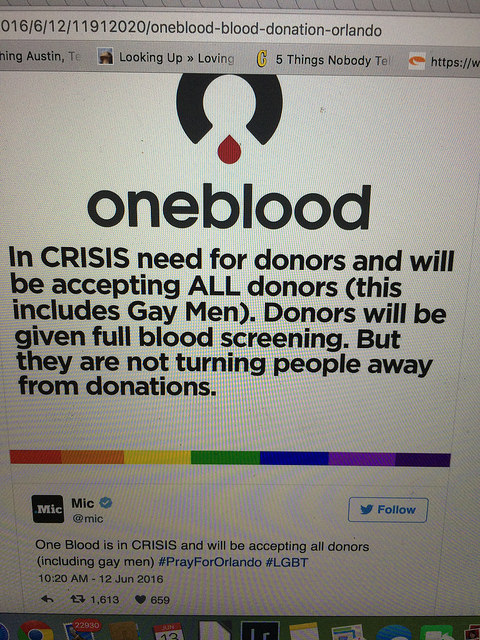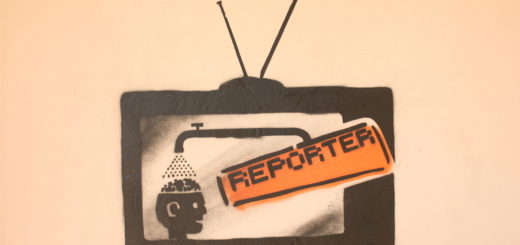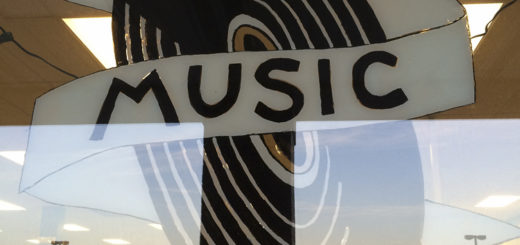The Orlando Shooting + Our Blood Supply
Waking up on Sunday morning to the news of the tragedy of the Pulse nightclub shooting in Florida, my first reaction was to text my brother-in-law in Florida.
Mr. Martin is an elementary school librarian in the Greater Tampa area. He’s a community event organizer, regular churchgoer, and all-around improvement to the civic good in Florida. He’s also gay.
One of the points of our textversation—a word I just made up to describe our chatting via thumbs on our cell phones—was that I had seen a tweet with the urgent need for blood donors in Orlando.
I told Mr. Martin that if I was in the area, I’d go donate some of my “O.”
Later, I realized that wasn’t true, because the blood bank would likely turn me away because I’m usually anemic. (I’ve been told that sick people don’t need my imperfect blood!)
Mr. Martin reminded me that even though the lifetime ban on donating blood that was put on men who have sex with other men in 1983 has been modified, there is still a ban. Now the FDA recommends a deferral on donations from men who have sex with men within the last year.
“Imagine if that was for all donors!” Mr. Martin pointed out via text, about,the restrictive donation deferment, which even applies to legally married gay couples in monogamous relationships.
If the rules were the same for all potential blood donors, we wouldn’t have any blood.
Later on that Sunday morning as the Governor of Florida was declaring a state of emergency and pictures of the alleged shooter were being circulated on social media, I noticed an article on The Verge that started out,

Before today, it was more difficult to donate blood as a gay man in Florida than to buy an assault rifle with no questions asked” said The Verge in a story shortly after the Orlando shooting.
That story noted a tweet that read,

One Blood is in CRISIS and will be accepting all donors (including gay men). All Donors will be given full blood screening. But we are not turning people away from donations.” #PrayForOrlando #LGBT
It later turned out that tweet had been made in error—or wishful thinking– the news was wrong, and the blood center in Orlando wasn’t taking blood donations from gay men. That was a heavy blow for what I thought was real progress in the progress towards equality.
While I’ve never been to the Pulse nightclub in Florida, I’ve danced till 2 a.m. at plenty of other gay nightclubs in the world, including those in Austin.
If I had happened to have been a victim in that shooting, I wouldn’t have wanted to wait for the necessary replacement for my anemic blood! I wouldn’t want to suffer further because of some outdated policy that doesn’t reflect the most modern testing and screening methods!
While screening and testing possible blood donors is important, we could make changes to keep up with modern times!
An article in VOX in December 2015 argued that a waiting period of about a month would more than adequately cover the needs of properly screening the blood supply. Vox quoted Dan Bruner, senior director of policy at Whitman-Walker Health, argued for a deferral period of not more than 30 days for men who have sex with men.
Although some may argue that a 12-month ban is better than a grossly outdated lifetime ban,” he said in a statement, “the updated policy is still discriminatory and not rooted in the reality of HIV testing today.
As I was in the process of writing this, the blood supply in Orlando got to capacity—as it often does after a tragedy–and people were turned away from donating on Sunday afternoon. It was also made clear that the blood center in Orlando was following the FDA guidelines—which means turning away donations from men who have had sex with other men during the past year.
It’s time to end an exclusionary and homophobic blood donation restriction that dates from an era where the Cold War was a going concern, the Internet hadn’t been invented, and cell phones were seldom spotted in the wild.
Having no more capacity to handle overwhelmingly generous blood donations is a good reason to turn people away from donating blood.
Outdated policies based on outdated fears, homophobia and vintage science are a very bad reason. It’s time to change the FDA guidelines for blood donation.
I’m not part of the LBGTQ community, but outdated bias impacts us all.






















